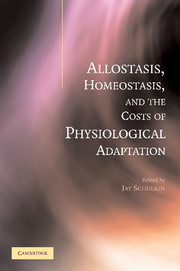Book contents
- Frontmatter
- Dedication
- Contents
- Preface
- Contributors
- Introduction
- 1 Principles of Allostasis: Optimal Design, Predictive Regulation, Pathophysiology, and Rational Therapeutics
- 2 Protective and Damaging Effects of the Mediators of Stress and Adaptation: Allostasis and Allostatic Load
- 3 Merging of the Homeostat Theory with the Concept of Allostatic Load
- 4 Operationalizing Allostatic Load
- 5 Drug Addiction and Allostasis
- 6 Adaptive Fear, Allostasis, and the Pathology of Anxiety and Depression
- 7 A Chronobiological Perspective on Allostasis and Its Application to Shift Work
- 8 Allostatic Load and Life Cycles: Implications for Neuroendocrine Control Mechanisms
- Commentary: Viability as Opposed to Stability: An Evolutionary Perspective on Physiological Regulation
- Index
Commentary: Viability as Opposed to Stability: An Evolutionary Perspective on Physiological Regulation
Published online by Cambridge University Press: 05 February 2015
- Frontmatter
- Dedication
- Contents
- Preface
- Contributors
- Introduction
- 1 Principles of Allostasis: Optimal Design, Predictive Regulation, Pathophysiology, and Rational Therapeutics
- 2 Protective and Damaging Effects of the Mediators of Stress and Adaptation: Allostasis and Allostatic Load
- 3 Merging of the Homeostat Theory with the Concept of Allostatic Load
- 4 Operationalizing Allostatic Load
- 5 Drug Addiction and Allostasis
- 6 Adaptive Fear, Allostasis, and the Pathology of Anxiety and Depression
- 7 A Chronobiological Perspective on Allostasis and Its Application to Shift Work
- 8 Allostatic Load and Life Cycles: Implications for Neuroendocrine Control Mechanisms
- Commentary: Viability as Opposed to Stability: An Evolutionary Perspective on Physiological Regulation
- Index
Summary
This volume contains a tremendous breadth of scientific research related to physiological regulation, from chronobiology to addiction. The authors approach the target concept, allostasis, from a wide range of perspectives. To the original conception of allostasis as “achieving stability through change”(Sterling and Eyer, 1988) have been added McEwen's conception of allostasis as the “process that maintains homeostasis,” the idea of an allostatic state, and the concepts of allostatic load and allostatic overload. Although there is generally broad agreement among the authors concerning the words used to define allostasis, allostatic state, and allostatic load, there are subtle, and some not so subtle, differences in conception of these concepts. For some, allostasis is inherently linked to pathology. In contrast, Sterling emphasizes the adaptive nature of allostatic processes. Some authors are primarily concerned with allostatic regulation in broad terms, whereas others are focused on the related concepts of allostatic state and allostatic load and their contributions to pathology and disease. Feed-forward systems, the induction of neuropeptides by steroids, extensive neural involvement with peripheral physiology, and the interactions between behavior and physiology also figure prominently. Some of the chapters are broadly physiological, where as others are targeted toward understanding human disease and pathology. The differing perspectives and research foci of the authors present what can be, at times, a confusing, but fascinating, mosaic on allostatic regulation of physiology.
The focus of the research of many of the authors in this volume is understanding the pathogenesis of the diseases of modern humans living in developed nations, especially adult-onset diseases. Their focus is on pathology and dysregulation of physiology, and they advance knowledge concerning the physiology of a large, long-lived adult organism that reproduces infrequently and rarely faces difficult life-or-death circumstances. The model organism of their research endeavors is not in danger of being eaten and faces trivial challenges in foraging for food, but does live and compete under circumstances far removed from its evolutionary history.
- Type
- Chapter
- Information
- Publisher: Cambridge University PressPrint publication year: 2004
- 4
- Cited by

